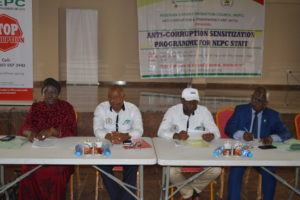ACTU, Effective Anti-Corruption Tool in MDAs, Says ICPC Chairman

The
Chairman of the Independent Corrupt Practices and Other Related
Offences Commission (ICPC), Professor Bolaji Owasanoye has declared that
members of the Anti-Corruption and Transparency Monitoring Units (ACTU)
in various Ministries, Departments and Agencies are better placed to
effectively prevent the incidence of corruption in such organizations.
Professor Owasanoye made this declaration during a sensitization programme organized by the ACTU of Nigerian Export Promotion Council (NEPC) for its staff at the agency’s headquarters in Abuja, recently.
The ICPC Chairman, pointed out that ACTUs had the capacity of making their organisations models in corruption-prevention, in line with the mandate of the Commission.
Speaking through Mr. Justin Kuatsea of the Corruption Monitoring and Evaluation Department of the Commission, Owasanoye charged the staff to embrace the spirit of fighting all forms of corruption, as well as, working with the ACTU executive in order to achieve a corruption-free NEPC.
He pointed out that the Unit was not meant to displace or challenge the authority of the management of the agency; rather, it was to assist in instilling transparent and accountable systems in the organisation through its core duties which include: undertaking periodic sensitization of staff; conducting preliminary investigations into complaints/reports; development of Code of Ethics/Conduct for compliance by staff; monitoring budget implementation and carrying out the study and review of corruption- prone processes and procedures in the organisation.
The Chairman also noted that the sensitization programme was a confirmation of the NEPC management’s belief and support of ACTU as a veritable instrument in fighting corruption in the public service.
In his remarks, the Executive Director/CEO of Nigerian Export Promotion Council, Mr. Olusegun Awolowo, who was represented by the Director of Policy and Strategy, Mr. Abdullahi Sidi-Alui, expressed profound appreciation to ICPC for being part of the organisation of the sensitization programme.
Awolowo went on to encourage members of staff to take a stand against corruption for a better NEPC.
Also speaking at the occasion, the ACTU Chairman, Mr. Saave Manakaan, Deputy Director, National Export Office, quoted the late sage , Chief Obafemi Awolowo, who was cited as having declared that, “The pursuit of wealth is not a bad thing in itself because without the food and comfort which wealth provides, life will be penurious and drab. But always remember that any wealth accumulated on a selfish basis, at the expense of the State in defiance of social justice helps to create a disorganized society in which everybody will eat everybody, and no one person can be safe”.
Mr. Manakaan also said, recently, a prominent Nigerian was quoted as asserting that “Corruption kills more than HIV/AIDS and malaria, and that the prognosis is not different from the one expressed by the late Sage”.
He added that “It implies that corruption is a diseased state of the mind that appears more difficult to diagnose and treat than malaria or HIV/AIDS. But that it is treatable, certainly more easily than malaria and HIV/AIDS especially when people stick to the ethos of self-control and self-discipline when confronted with perennial temptations of corruption”.
Professor Owasanoye made this declaration during a sensitization programme organized by the ACTU of Nigerian Export Promotion Council (NEPC) for its staff at the agency’s headquarters in Abuja, recently.
The ICPC Chairman, pointed out that ACTUs had the capacity of making their organisations models in corruption-prevention, in line with the mandate of the Commission.
Speaking through Mr. Justin Kuatsea of the Corruption Monitoring and Evaluation Department of the Commission, Owasanoye charged the staff to embrace the spirit of fighting all forms of corruption, as well as, working with the ACTU executive in order to achieve a corruption-free NEPC.
He pointed out that the Unit was not meant to displace or challenge the authority of the management of the agency; rather, it was to assist in instilling transparent and accountable systems in the organisation through its core duties which include: undertaking periodic sensitization of staff; conducting preliminary investigations into complaints/reports; development of Code of Ethics/Conduct for compliance by staff; monitoring budget implementation and carrying out the study and review of corruption- prone processes and procedures in the organisation.
The Chairman also noted that the sensitization programme was a confirmation of the NEPC management’s belief and support of ACTU as a veritable instrument in fighting corruption in the public service.
In his remarks, the Executive Director/CEO of Nigerian Export Promotion Council, Mr. Olusegun Awolowo, who was represented by the Director of Policy and Strategy, Mr. Abdullahi Sidi-Alui, expressed profound appreciation to ICPC for being part of the organisation of the sensitization programme.
Awolowo went on to encourage members of staff to take a stand against corruption for a better NEPC.
Also speaking at the occasion, the ACTU Chairman, Mr. Saave Manakaan, Deputy Director, National Export Office, quoted the late sage , Chief Obafemi Awolowo, who was cited as having declared that, “The pursuit of wealth is not a bad thing in itself because without the food and comfort which wealth provides, life will be penurious and drab. But always remember that any wealth accumulated on a selfish basis, at the expense of the State in defiance of social justice helps to create a disorganized society in which everybody will eat everybody, and no one person can be safe”.
Mr. Manakaan also said, recently, a prominent Nigerian was quoted as asserting that “Corruption kills more than HIV/AIDS and malaria, and that the prognosis is not different from the one expressed by the late Sage”.
He added that “It implies that corruption is a diseased state of the mind that appears more difficult to diagnose and treat than malaria or HIV/AIDS. But that it is treatable, certainly more easily than malaria and HIV/AIDS especially when people stick to the ethos of self-control and self-discipline when confronted with perennial temptations of corruption”.







No comments